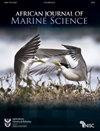南非东开普省庞多兰海洋保护区内标记的纳塔尔海鱼运动模式
IF 1.4
4区 生物学
Q3 MARINE & FRESHWATER BIOLOGY
引用次数: 0
摘要
摘要对南非东海岸庞多兰海洋保护区(PMPA)的纳塔尔海鱼Galeichthys troworum进行了标签重捕研究。8年共捕获473条鱼,16年共捕获136条(28.8%),其中部分鱼多次被捕获。大多数(82%)被重新捕获的地点距离释放地点200米以内,活动范围为0至617米,自由时间为0至3407天(9.3年)。数据分析表明,所有重新捕获的鱼都停留在相对较小的活动范围内(约360米的线性距离),没有鱼放弃活动范围并移出2平方公里的采样区。虽然PMPA的禁渔区为这些鱼类提供了有效的保护,但它们在邻近的开发区内的相对丰度相似。这可能是因为弓形虫不是一种理想的线型鱼类,大多数被捕获的个体被释放,再加上释放后的存活率很高。关键词:开采区叉长家园距离站点保真站保持标签与释放本文章由计算机程序翻译,如有差异,请以英文原文为准。
Movement patterns of Natal seacatfish Galeichthys troworum (Ariidae) tagged in the Pondoland Marine Protected Area, Eastern Cape, South Africa
AbstractA tag-recapture study was undertaken on the Natal seacatfish Galeichthys troworum in the Pondoland Marine Protected Area (PMPA) on the east coast of South Africa. A total of 473 fish were tagged over a period of 8 years, and 136 individuals (28.8%) were recaptured over a period of 16 years, some of them on multiple occasions. Most recaptures (82%) were caught within 200 m of their release site, with movements ranging between 0 and 617 m, and time-at-liberty ranging between 0 and 3 407 days (9.3 years). Data analysis showed that all recaptured fish remained in relatively small home ranges (of ∼360 m linear distance) and none of them abandoned their home range and moved out of the 2-km2 sampling blocks. While the no-take area of the PMPA provided effective protection for these fish, their relative abundance was similar in an adjacent exploited area. This is likely because G. troworum is not a desired linefish species, with most individuals caught being released, coupled with high post-release survival.Keywords: exploited areafork lengthhome rangesite fidelitystation-keepingtag and release
求助全文
通过发布文献求助,成功后即可免费获取论文全文。
去求助
来源期刊

African Journal of Marine Science
生物-海洋与淡水生物学
CiteScore
2.60
自引率
16.70%
发文量
17
审稿时长
6-12 weeks
期刊介绍:
The African (formerly South African) Journal of Marine Science provides an international forum for the publication of original scientific contributions or critical reviews, involving oceanic, shelf or estuarine waters, inclusive of oceanography, studies of organisms and their habitats, and aquaculture. Papers on the conservation and management of living resources, relevant social science and governance, or new techniques, are all welcomed, as are those that integrate different disciplines. Priority will be given to rigorous, question-driven research, rather than descriptive research. Contributions from African waters, including the Southern Ocean, are particularly encouraged, although not to the exclusion of those from elsewhere that have relevance to the African context. Submissions may take the form of a paper or a short communication. The journal aims to achieve a balanced representation of subject areas but also publishes proceedings of symposia in dedicated issues, as well as guest-edited suites on thematic topics in regular issues.
 求助内容:
求助内容: 应助结果提醒方式:
应助结果提醒方式:


